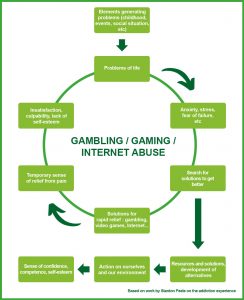Factors that can lead to gambling addiction
Environment
This factor is the root of the development of a gambling problem, since there are many opportunities to gamble close to home: casinos or gaming halls, video lottery terminals in bars, restaurants and neighbourhood pubs, convenience store or grocery store terminals… This increased presence of gambling opportunities contributes to shaping an environment where gambling is socially acceptable, encouraged and even promoted.
Not only that, but the availability of online gambling also contributes to addiction development, since any computer or smartphone can be used to gamble from the comfort of your home, at any time of the day or night. The closure of bars and casinos due to the COVID-19 pandemic has resulted in a sharp increase in online gambling.
Influence from other players
If someone you know gambles, there is a greater chance that you will also start gambling. However, learning to gamble from relatives is usually done without risk prevention measures. You could therefore be quickly influenced by your loved one’s speech, who, for example, will more easily brag about their winnings than their losses to convince you to gamble, too.
Conditioning and “gambling fever”
When you start gambling, you expose yourself to a form of conditioning. The game’s rewards contribute to the development of errors in thinking that alter your perception and experience as a player. This is especially true when your first few games result in a series of smaller or larger wins, a phase often referred to as “beginner’s luck.” This illusion of luck creates a feeling of euphoria from your first experience with gambling and encourages you to try again. In reality, the brain memorizes wins more easily than losses and you are quickly convinced that your luck will soon change again: you are approaching the trap.
Psychological predispositions
There are many psychological factors that can contribute to the development of an addiction, whether to gambling or to other behaviours or substances. Here are some examples:
- Childhood trauma
- Anxiety, depressive mood disorder
- Repressed emotions
- Unmet needs
- Low tolerance for boredom
- Attention deficit hyperactivity disorder (ADHD)
- Stressful personal, family or professional situation
- Difficulty dealing with problems
- And so on.
These factors can create an emotional imbalance, making people more vulnerable to a gambling addiction.
Habit
Above all, the game should be entertainment. But it can quickly become a habit, even a routine. With the massive migration to online gambling, especially due to the COVID-19 pandemic, it is even more difficult to control the time spent gambling. When, for example, the slot machine is literally at arm’s length on your cell phone or computer, routines can quickly develop: a few games when you wake up, a few games during dinner, a few games in bed before going to sleep…
Lure of winning and its pursuit
Of course, the lure of winning is one of the primary motivations for gambling. You’ve seen many times when complete strangers have made headlines for winning millions in a game. Why not you? The problem is that while these winners are highlighted in the media, they are the only winners among millions of unmentioned losers.
As gambling habits take hold, the lure of winning takes on a different form and a damage management mechanism emerges: as you accumulate losses, your desire to continue is motivated by the desire to “make it up.” This way you hold on to the hope of winning the jackpot to make up for all your lost bets. This trap is particularly powerful, since by persisting, you risk accumulating more and more losses, and thus feeding that need to make up for it, while at the same time pushing yourself further into problem gambling behaviour.
Illusion of controlling chance
There is one element over which we have no power: chance. With it, intelligence and skill do not count. However, when faced with a game of chance, you spontaneously call upon your intelligence, as if it were a game of skill. You develop strategies, rituals. But it is all in vain. Chance is unpredictable and uncontrollable: it leaves us all powerless, whether we are intelligent or not.
Superstitions cannot influence chance either: blowing on the dice before throwing them, wearing a fetish garment, playing one’s “lucky” numbers..
In fact, the statistics are clear: the odds of losing are much higher than the odds of winning. Playing more will not make you win more. If, for example, the probability of winning a game is 1 in 100, and you have lost 99 times, you may not win the 100th time. This 1 in 100 probability is reset to zero with each new game. Only chance will decide, and there is nothing you can do about it.

